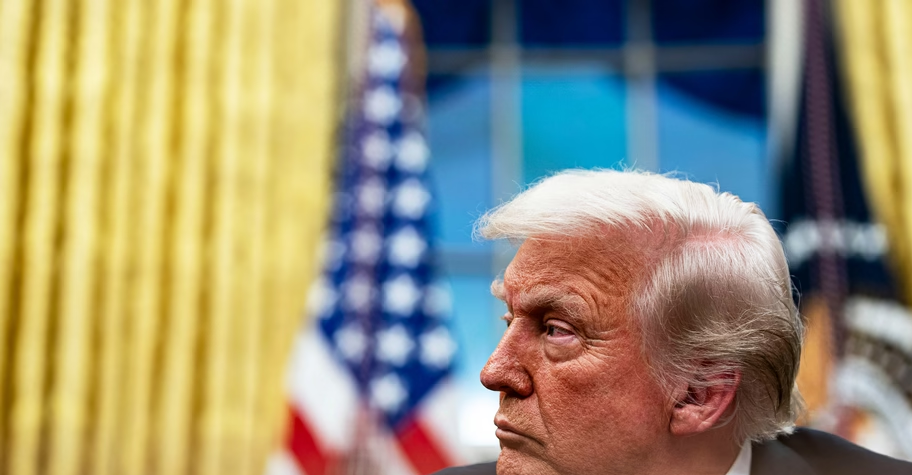Donald Trump sees himself as national king—and every other American as one of his quavering subjects.

Al Drago / Bloomberg / Getty
February 21, 2025, 5:27 PM ET
The Trump administration is enmeshed in a long and rapidly growing list of legal challenges to the novel powers it has claimed for itself. But to try to understand the situation in terms of the individual cases, and the legal questions they implicate, is to miss the forest for the trees. The larger picture is that Donald Trump refuses, or is simply unable, to grasp any distinction between the law and his own whims.
That conflation was on display once again today at a meeting of governors at the White House. As Trump lectured the audience on his executive order banning transgender girls and women from participating in girls’ and women’s sports, he paused to single out Maine Governor Janet Mills.
“Are you not going to comply with it?” he demanded of her. “I’m complying with state and federal laws,” she replied. To this, Trump shot back, “We are the federal law.”
It is entirely possible that, if the state of Maine challenges the executive order, Trump will prevail legally. But what is important about this exchange is not whose interpretation of Title IX and the Administrative Procedure Act has a better chance to win five votes on the Supreme Court. It is that Trump is treating the law as coterminous with his own desires.
Trump then threatened Mills with the prospect of stripping away federal funding for her state: “You better do it, because you’re not going to get any federal funding at all if you don’t.” Legally, it is possible for the federal government to deny states certain funding streams under certain conditions. But Trump cannot simply cut Maine off financially because the state chooses to challenge a federal policy. Distinctions like this, however, seem totally lost on the president, who sees his role as national king—note his use of the royal “we”—and every other American, including each of the 50 states, as one of his quavering subjects.
Jonathan Chait: Trump says the corrupt part out loud
Trump has grown ever more brazen about his belief that his activities are by definition legal, and activities he opposes by definition criminal. That belief is implied by a long, long list of statements and actions, stretching from his career in business, when he routinely treated laws (forbidding him from discriminating against black tenants or committing tax fraud) as suggestions; to the final days of his presidency, when he attempted to overturn his election defeat; to his post-presidency, when he flagrantly disregarded requirements that he turn over classified documents. It is also implied by his habit of describing a long list of political opponents as criminals.
Trump recently summarized this belief by writing on X, “He who saves his Country does not violate any Law.” (The possibly apocryphal quote is commonly attributed to Napoleon Bonaparte, who was, famously, a dictator.) His statement to Mills is utterly consistent with this belief: Since Trump cannot violate the law, it follows that the law means whatever he says. He has progressed from demonstrating his disregard for the law to stating it as a doctrine.
Trump’s supporters have followed his lead. When the White House announced a spending freeze last month, Matthew J. Vaeth, acting director of Trump’s budget office, wrote, “Career and political appointees in the Executive Branch have a duty to align Federal spending and action with the will of the American people as expressed through Presidential priorities.” Of course, the Constitution does not say that the will of the people is expressed exclusively through the president. It divides legitimate authority between three branches of government, resting the spending authority in the hands of Congress.
Paula White, the newly appointed White House faith adviser, has gone further, once stating, “To say no to President Trump would be saying no to God.” Far from reassuring the American people that they continue to live in a democratic republic, Trump and the White House have lately leaned into the divine-right theme with a series of social media posts depicting Trump as a king for overruling New York City’s congestion pricing system.
David A. Graham: The world’s most powerful unelected bureaucrat
Last week, The Wall Street Journal editorial board, which has occasionally scolded Trump for his naughtiness, dismissed fears that the country is entering a constitutional crisis as “overwrought.” Trump, the editors insisted, was merely testing the bounds of his executive authority, in this case by destroying a series of federal programs and agencies authorized by Congress. It is true, as the Journal argues, that previous presidents have tested the boundaries of their authority. But there is a point at which the executive branch moves so far and so fast that the eventual promise of legal redress means little. If you fire all the employees of a department and cancel its contractors, they’ll go broke waiting for the Supreme Court to rule in their favor. Imagine a Democratic administration setting out to replace every white Evangelical church in America with EV charging stations—even if they agreed to abide by the courts in the event of an adverse ruling, this wouldn’t offer much comfort.
But the larger dynamic is that Trump isn’t merely pushing to redefine the boundaries of the law or even the Constitution. He is rejecting the principle that the law constrains him at all. The existence of a constitutional crisis cannot be understood solely in terms of the discrete claims of the executive branch vis-à-vis the other two. A president who maintains that the law means whatever he wants it to mean is a constitutional crisis.



